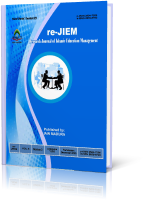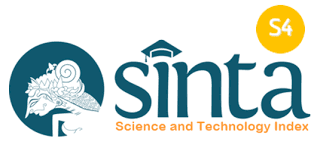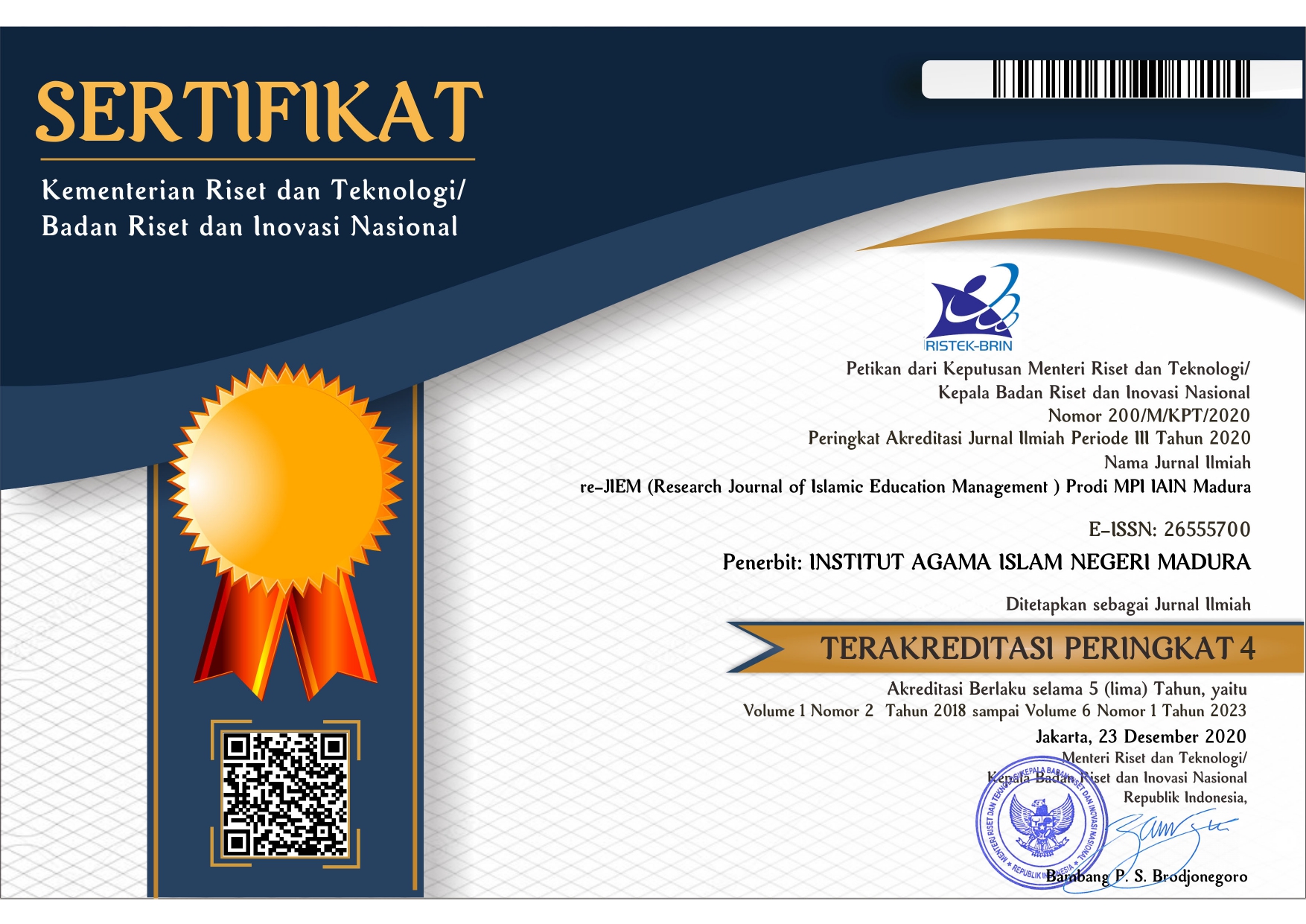IMPLEMENTATION OF ISLAMIC EDUCATION CURRICULUM MANAGEMENT BASED ON PESANTREN LOCAL WISDOM IN THE ERA OF DISRUPTION
 Abstract views: 132
,
Abstract views: 132
,
 PDF downloads: 131
PDF downloads: 131
Abstract
This research is motivated by the development of Islamic religious education at Madrasah Aliyah Pondok Pesantren Mambaul Ulum Bata-Bata, where the curriculum patterns have become increasingly diverse over time. The purpose of this study is to describe the implementation of Islamic education curriculum management based on the local wisdom of the pesantren. A qualitative approach with a phenomenological type is used. Data was collected through interviews, observations, and documentation. Data analysis was conducted through the stages of reduction, data display, and conclusion drawing/verification. The results of the study show that the curriculum is implemented through the stages of planning, curriculum implementation, structured program arrangements, assignment of teaching duties, and curriculum evaluation or assessment. Meanwhile, the subjects programmed by the pesantren are integrated into the learning process at Madrasah Aliyah, consisting of two majors: Science and Social Studies, including Science, Taruna, Research, Regular, and Intensive classes.
Downloads
References
Khoiri. “Wawancara Langsung Wakasek Kurikulum,” 2023.
Khoiruddin, Moh. “Pendidikan Islam Tradisional Dan Modern” 25, no. 2 (2018). http://ejournal.kopertais4.or.id/pantura/index.php/tasyri/article/view/3326.
Miles, M.B., and A.M. Huberman. Analisis Data Kualitatif. Jakarta: Universitas Indonesia, 2018.
Muktar, Muktar. “KOLABORASI PENDIDIKAN TRADISIONAL DAN PENDIDIKAN UMUM (DAYAH, SEKOLAH AGAMA DAN SEKOLAH UMUM).” SINTESA: Jurnal Kajian Islam Dan Sosial Keagamaan 2, no. 1 (June 19, 2021): 1–23. https://doi.org/10.22373/SINTESA.V2I1.232.
Nasution, Abdul Fattah, and Meyniar Albina. “Manajemen Kurikulum Pendidikan Agama Islam Di Madrasah Aliyah Negeri Labuhanbatu.” Edukasi Islami: Jurnal Pendidikan Islam 11, no. 03 (October 31, 2022): 957–72. https://doi.org/10.30868/EI.V11I03.3063.
Qomar, Mujamil. Manajemen Pendidikan Islam. Surabaya: Erlangga, 2007.
Rofie, Moh. “MANAJEMEN KURIKULUM PENDIDIKAN AGAMA ISLAM BERBASIS PESANTREN (Studi Kasus Di Tarbiyatul Muallimien Al-Islamiyah Al-Amien Prenduan).” Reflektika 12, no. 2 (February 14, 2018): 149–69. https://doi.org/10.28944/REFLEKTIKA.V12I2.104.
Saepudin, Juju. “Pendidikan Agama Islam Pada Sekolah Berbasis Pesantren: Studi Kasus Pada SMP Al Muttaqin Kota Tasikmalaya.” EDUKASI: Jurnal Penelitian Pendidikan Agama Dan Keagamaan 17, no. 2 (August 31, 2019): 172–87. https://doi.org/10.32729/EDUKASI.V17I2.559.
Sauri, Sofyan. “NILAI KEARIFAN LOKAL PESANTREN DALAM UPAYA PEMBINAAN KARAKTER SANTRI.” Nizham: Jurnal Studi Keislaman 2, no. 2 (September 24, 2017): 21–50. https://e-journal.metrouniv.ac.id/index.php/nizham/article/view/859.
Syukron. “Wawancara Langsung Guru MA Mambaul Ulum,” 2023.
Tabroni, Imam, Erfian Syah, and Siswanto. “Manajemen Kurikulum Pendidikan Islam Pada Masa Covid-19 Di Masjid Hayatul Hasanah Dan Baitut Tarbiyah Dinas Pendidikan Kabupaten Purwakarta.” Islamic Management: Jurnal Manajemen Pendidikan Islam 5, no. 01 (January 29, 2022): 125–36. https://doi.org/10.30868/IM.V5I01.2141.
Wahyuni, Sri Intan. “Manajemen Kurikulum Pendidikan Agama Islam Bagi Anak Berkebutuhan Khusus Di SLB Al Azhar Bukittinggi.” MANAGERIA: Jurnal Manajemen Pendidikan Islam 4, no. 2 (December 18, 2019): 219–40. https://doi.org/10.14421/MANAGERIA.2019.42-03.
Copyright (c) 2024 Moh Hafid Effendy, Agus Purnomo Ahmad Putikadyanto, Masyithah Maghfirah Rizam

This work is licensed under a Creative Commons Attribution-ShareAlike 4.0 International License.
Authors who publish with this journal agree to the following terms:
Authors retain copyright and grant the journal right of first publication with the work simultaneously licensed under a Creative Commons Attribution-ShareAlike 4.0 International License that allows others to copy and redistribute the material in any medium or format with an acknowledgment of the work's authorship and initial publication in this journal and also allows to remix, transform, and build upon the material for any purpose, even commercially with contributions under the same license as the original.
Authors are able to enter into separate, additional contractual arrangements for the non-exclusive distribution of the journal's published version of the work (e.g., post it to an institutional repository or publish it in a book), with an acknowledgment of its initial publication in this journal.
Authors are permitted and encouraged to post their work online (e.g., in institutional repositories or on their website) prior to and during the submission process, as it can lead to productive exchanges, as well as earlier and greater citation of published work.



























